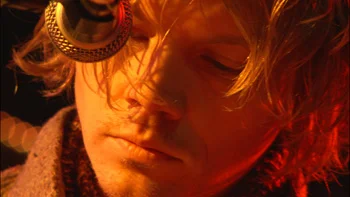Hey guys, Ben here. I'm reposting this review I wrote last fall about Echotone, a music documentary I enjoyed so much that I decided to bring it back to Denver for the UMS festival. It's playing tomorrow night (Saturday) at the Spark Theater at 240 S. Broadway. See you there!

Echotone is not necessarily about the hottest sounds coming out of Austin, TX. In fact, some of the featured bands aren’t really my thing. However, that does not detract from the documentary’s appeal in the slightest. Belaire’s twee-rock, Bill Baird’s Amiee Mann-esque pop, and Black Joe Lewis’ big band funk may or may not be your cup of tea, but their struggle is universal. If you are in a band, if you have ever thought about what it might take to “make it,” or if you have even the smallest dog in the local music fight, you must, must, must see Echotone. More than observing one band ever could, the amalgamation of voices and points of view in Echotone provides perspective about the totally fucked current relationship between music and commerce.
In Austin, as in many major cities, high-rise apartment buildings are being built in previously non-residential, hip neighborhoods. For Austin, that means a clash between established, loud and proud music venues and their new neighbors, who would appreciate being able to sleep without the buzz saw squeal of electric guitars drifting into their bedroom window at 2am. Director Nathan Christ found that the increased pressure and restrictions placed on the Austin music scene had a direct effect on the struggles of the musicians he was already following. At a recent Denver Film Festival screening, Christ admitted that the project started as a sort of “making the band,” where he would follow bands on the rise around and tell the story of their success. However, due to the increasingly overwhelming stresses these musicians faced the movie morphed organically into the story of Austin’s battle against gentrification. Echotone is loose around the edges, and there is a natural, predictable disconnect between the less informed ramblings of some of the musicians and the big picture footage about the fate of Austin music. Christ overcomes this loose focus, using the breadth of discussion to the movie’s advantage. Echotone could have very easily ended up sounding like a message movie, but instead presents an interesting conflict and a wide swath of opinion without judgment.

The featured bands range in talent, ability, and success, and their opinions and expectations vary just as extremely. Several acts pay lip service to the idea of making music for reasons other than money and fame, but none seem entirely able to embody that ideal in practice. Belaire's Cari Palazzolo delights in making DIY album art with wrapping paper, paint, and sharpies, but later she reveals that Belaire sold a song to Olay Skin Care for use in a commercial. Ultimately, Belaire decides to avoid going down the commercial path, but it’s revealing that even Echotone’s most self-aggrandizingly independent subjects are tempted to follow the money trail. This is not a knock on Belaire at all. We’re all human, and the attraction to making money from your art is understandable and easy to relate to.
None of Echotone's featured artists find an easy balance between art and money. Bill Baird, who signed to Capitol Records with his group Sound Team, lost perspective due to limitless funds and mounting pressure. Their one album for Capitol was a self-proclaimed overproduced mess. They were dropped from the label after their record failed to catch on. Without direction, not to mention ownership of their songs, Sound Team broke up soon afterward. Baird can’t really articulate what he learned from the experience. As he walks the streets of downtown Austin during the madness of SXSW, he notes that bands feel like they’ve made it when they get accepted into that infamous festival. However, when they actually get there, they realize that 7000 other unsigned bands were also accepted, not to mention the thousands more bands playing unofficial shows. These bands haven’t made it. They’ve just entered another level of the maze.

Success is fleeting for most talented musicians. It is a pretty clear indicator that there is something wrong with the system when Black Joe Lewis is the opening act on a Dave Matthews Band tour and still has to work a side job as a fish delivery man. Echotone points out that even in Austin, TX, the so-called “music capital of the world,” supporting yourself through your creative efforts is for most an impossible dream no matter how hard you work or how talented you are. Musicians are up against angry neighbors in a city increasingly and inexplicably hostile against live music. They’re up against their own lack of business knowhow. And perhaps worst of all, they’re up against the sheer overwhelming volume of other artists and musicians who are also looking for a big break. With so much talent to trade out, there is no incentive for anyone with capital to lend a helping hand, making it impossibly difficult for talented, driven people to make even a meager living off of their passion.
-Ben